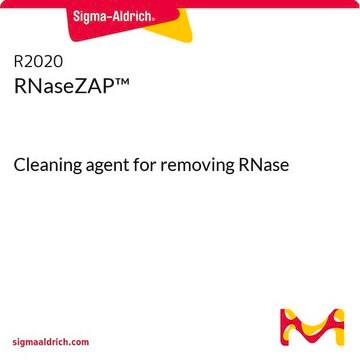R1158
Ribonuclease Inhibitor
recombinant, expressed in E. coli, 20-40 units/μL
Synonym(s):
RNAse inhibitor
Sign Into View Organizational & Contract Pricing
All Photos(1)
About This Item
Recommended Products
recombinant
expressed in E. coli
Quality Level
grade
for molecular biology
form
buffered aqueous solution
mol wt
~50 kDa
concentration
20-40 units/μL
shipped in
dry ice
storage temp.
−20°C
Looking for similar products? Visit Product Comparison Guide
General description
Ribonuclease inhibitor works to inhibit RNase activity by forming a tight, non-covalent 1:1 complex. It is derived from E. coli which expresses portions of the human placental ribonuclease inhibitor. It inhibits RNases A, B, and C. It will not inhibit RNases H, 1, T1, S1 Nuclease, SP6, T7 RNA Polymerase, T3 RNA Polymerase, AMV Reverse Transcriptase, M-MLV Reverse Transcriptase, or Taq Polymerase. The inhibitor can be removed by phenol extraction or by heating to 65°C for 10 minutes. The pH range for inhibition is pH 5.5–9 (highestinhibition at pH 7–8).
Application
Ribonuclease Inhibitor is suitable for use in useful for in vitro inhibition of ribonucleases, including procedures like:
- cDNA synthesis from mRNA
- reverse transcriptase polymerase chain reaction (RT-PCR)
- in vitro transcription and translation
- mRNA protection from degradation
- formaldehyde cross-linked lncRNA purification
- RNA-fluorescence in situ hybridization (FISH)
Useful for in vitro inhibition of ribonucleases, including procedures like cDNA synthesis, RT-PCR, and in vitro transcription and translation.
Biochem/physiol Actions
Inhibits RNase by forming a tight, non-covalent 1:1 complex.
Components
Ribonuclease Inhibitor is provided as a solution in 20 mM HEPES-KOH( pH 7.6), 50 mM KCl, 8 mM DTT and 50% glycerol.
Unit Definition
One unit will reduce the activity of 5 ng of ribonuclease A by 50% in a cytidine 2′:3′-cyclic monophosphate system.
Physical form
Solution in 20 mM HEPES-KOH, pH 7.6, 50 mM KCl, 8 mM DTT and 50% glycerol.
Other Notes
- Denaturing conditions (i.e., urea or temperatures ≥50 °C) should be avoided as they may cause a release of active ribonuclease from the complex.
- This product is for R&D use only, not for drug, household, or other uses.
related product
Product No.
Description
Pricing
Storage Class Code
10 - Combustible liquids
WGK
WGK 2
Flash Point(F)
Not applicable
Flash Point(C)
Not applicable
Certificates of Analysis (COA)
Search for Certificates of Analysis (COA) by entering the products Lot/Batch Number. Lot and Batch Numbers can be found on a product’s label following the words ‘Lot’ or ‘Batch’.
Already Own This Product?
Find documentation for the products that you have recently purchased in the Document Library.
Customers Also Viewed
Comparison of in vitro viability methods for Cryptosporidium oocysts
Burgt NHV, et al.
Experimental Parasitology, 187, 30-36 (2018)
Nathan H Vande Burgt et al.
Experimental parasitology, 187, 30-36 (2018-03-09)
The water-borne protozoan parasite Cryptosporidium parvum forms oocysts that can persist for long periods of time in the environment, even though the sporozoites inside the oocysts may no longer be viable, making it difficult to assess the associated risk of
Nadia A Hasaneen et al.
American journal of physiology. Lung cellular and molecular physiology, 293(4), L1059-L1068 (2007-08-19)
Angiogenesis is an important feature of airway remodeling in both chronic asthma and chronic obstructive pulmonary disease (COPD). Airways in those conditions are exposed to excessive mechanical strain during periods of acute exacerbations. We recently reported that mechanical strain of
Antisense overlapping long non-coding RNA regulates coding arachidonate 12-lipoxygenase gene by translational interference
Sabbir MG, et al.
Biochimica et Biophysica Acta - Molecular and Cell Biology of Lipids, 1866(10), 158987-158987 (2021)
Lintao Li et al.
Cell cycle (Georgetown, Tex.), 22(4), 476-493 (2022-11-13)
Whether long non-coding RNA Mir-99a-Let-7c Cluster Host Gene (LncRNA MIR99AHG) is involved in osteoporosis (OP) remains vague, so we hereby center on its implication. Old C57BL/6J mice were injected with the silencing lentivirus of MIR99AHG and subjected to microCT analysis
Our team of scientists has experience in all areas of research including Life Science, Material Science, Chemical Synthesis, Chromatography, Analytical and many others.
Contact Technical Service












